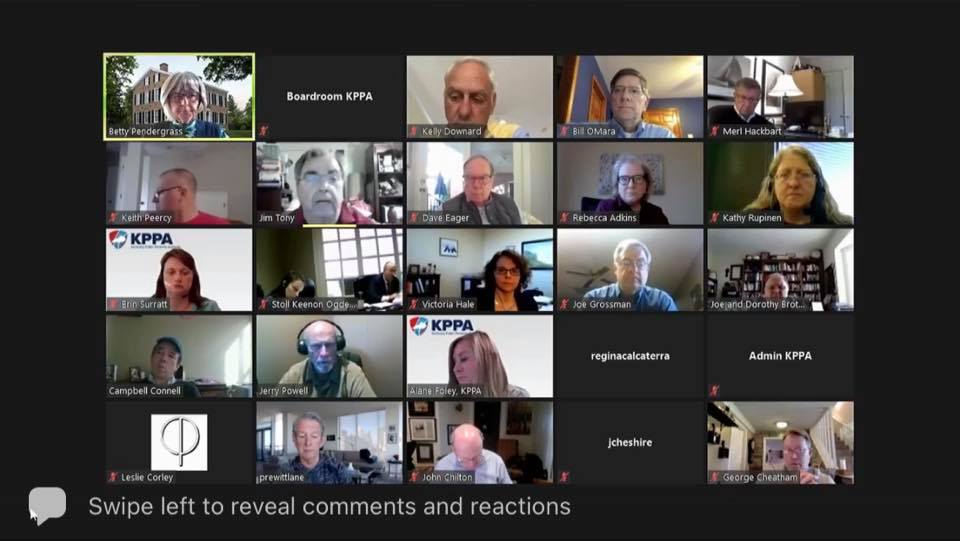
The April 2 joint special meeting of the Kentucky Public Pension Authority and the County Employees Retirement System may have violated the state's open meetings law.
The public agency formerly known as the Kentucky Retirement Systems ("KRS") was renamed and reorganized as the Kentucky Public Pension Authority ("KPPA"), effective April 1, "per House Bill 484 from the 2020 Legislative Session."
One day later, KPPA met in a special joint meeting with the County Employees Retirement System ("CERS"), governance of which also shifted to a new 9-member CERS board of trustees on April 1.
The meeting agenda contained two items (other than Roll Call, Public Comment, and Adjournment): a four to six hour "Closed Session [Pending Litigation KRS61.810(1)(c)" and "Action Taken on Matters Discussed in Closed Session, If Necessary."
https://kyret.ky.gov/About/Meeting-Calendar/Agendas/04.02.21%20CERS%20K…
KRS 61.810(1)(c) is the exception to the open meetings law that permits closed session "discussions of proposed or pending litigation against or on behalf of the public agency."
https://apps.legislature.ky.gov/law/statutes/statute.aspx?id=48229
It is the exception to the open meetings law that has been repeatedly construed to only "apply to matters commonly inherent to litigation, such as preparation, strategy or tactics" and matters relating to proposed or pending litigation "that would include the attorney-client relationship".
https://caselaw.findlaw.com/ky-supreme-court/1012466.html
The Kentucky Supreme Court has admonished that KRS 61.810(1)(c) "should not be construed to apply 'any time the public agency has its attorney present." It cannot be invoked to authorize "general discussions of 'everything tangential to the topic.'"
Neither yesterday's special meeting agenda nor the motion to enter closed session identified the pending litigation to which yesterday's closed session discussion related or, alternatively, if proposed litigation against or on behalf of the KPPA is or has been threatened.
Because the motion to enter closed session omitted this critical detail, the public cannot assess the propriety of the KPPA's closed session discussion.
The public might assume the discussion of "preparation, strategy, or tactics" related to the pending Mayberry litigation in Franklin Circuit Court. While a four hour closed discussion of these topics seems excessive, we do not know — which is, of course, our statutory right.
What we know is that delivery of a much anticipated investigative report into "specific investment activities conducted by the Kentucky Retirement Systems to determine if there are any improper or illegal activities" — is imminent.
That report was prepared by Calcaterra Pollack LLC under a contract with the public agency formerly known as Kentucky Retirement Systems at a cost to taxpayers of $1.2 million.
https://secure.kentucky.gov//TransparencyWebApi/v1/Contract/ContractPDF…
(Access to that report raises major open records issues —which we analyzed in a February 2 post. Yesterday's open government issues were ostensibly limited to possible open meetings issues.)
https://www.facebook.com/419650175248377/posts/856684941544896/?d=n
What we also know is that under the terms of the contract between Calcaterra Pollack and the KRS, Calcaterra Pollack is "ineligible to represent the Kentucky Retirement Systems in any litigation that may potentially arise from the investigation."
The contract makes clear that Calcaterra's role is that of investigator and not legal advisor.
Nevertheless, that portion of yesterday's joint meeting that was video teleconferenced confirms that Regina Calcaterra attended the meeting including, presumably, the four hour closed session.
As a non-party to proposed or pending litigation, an attorney for a party, or an employee of an attorney for a party, her presence in the four hour closed session "was inconsistent with invocation of the attorney-client privilege and a confidential discussion of strategy and tactics, regardless of the constraints that were placed upon her relative to subsequent discussion of what she heard and saw. The protections afforded by the attorney-client privilege and the 'pending litigation' exception were defeated by [Calcaterra's] presence."
https://ag.ky.gov/Priorities/Government-Transparency/orom/2000/00OMD219…
If we assume that the motion to conduct a closed session was adequate (notwithstanding the failure to identify the pending litigation to which it related or the proposed litigation contemplated); and if we assume that the four hour closed session discussion focused exclusively(and exhaustively) on "preparation, strategy, or tactics," rather than, as might reasonably be inferred, matters tangential to the litigation, such as a preview of Calcaterra Pollack's investigative findings, and that the closed session was otherwise permissible, one problem remains.
Regina Calcaterra's unexplained presence in the four hour closed session.
There are narrow exceptions to the prohibition on selective admission of non-members to a public agency's closed session. None were identified here.
This does not bode well for the transparency and accountability of the newly reconfigured Kentucky Public Pension Authority — a public agency whose predecessor had a troubling history of secrecy and opacity — or the County Employees Retirement System.
https://apps.legislature.ky.gov/CommitteeDocuments/287/12154/9%2023%202…
The next big open government test will be disclosure of the $1.2 million investigative report prepared by Calcaterra Pollack once it is delivered to KPPA.



